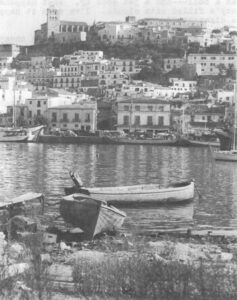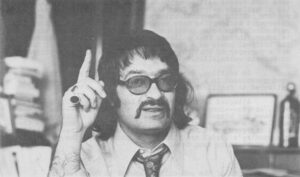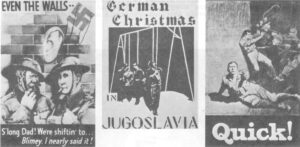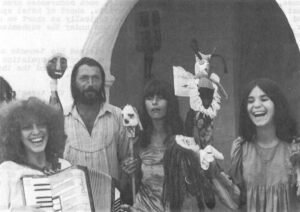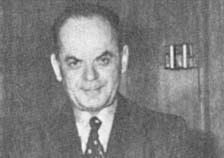Tim sits guzzling cheap beer down by the docks on Ibiza. He’s 57, sun-burned to a ripe mahagony, and keeps brushing shoulder-length gray hair from the tangle of his full, white beard. Otherwise he sits in total repose, only his mouth moving in clipped Cockney accents.
“Rubbish,” he says. “Full of chemicals. San Miguel is the worst beer this side of the Indian Ocean.” Nevertheless, he continues to drink it in quantity.
“Look at that,” he says, raising his eyes in disgust at a white thread crossing the sky. “Jet trails! Did you see yesterday’s paper? Some idiot-scientists have finally gotten around to noticing that jets affect the weather. Why, I could have told them that ten years ago. Any bum lying on the beach knows it. A beautiful sunny day — clear as a bell — and a jet goes by. What happens? In 15 minutes the sky’s filled with clouds. I’ve seen it happen a thousand times. Got a cigarette?”
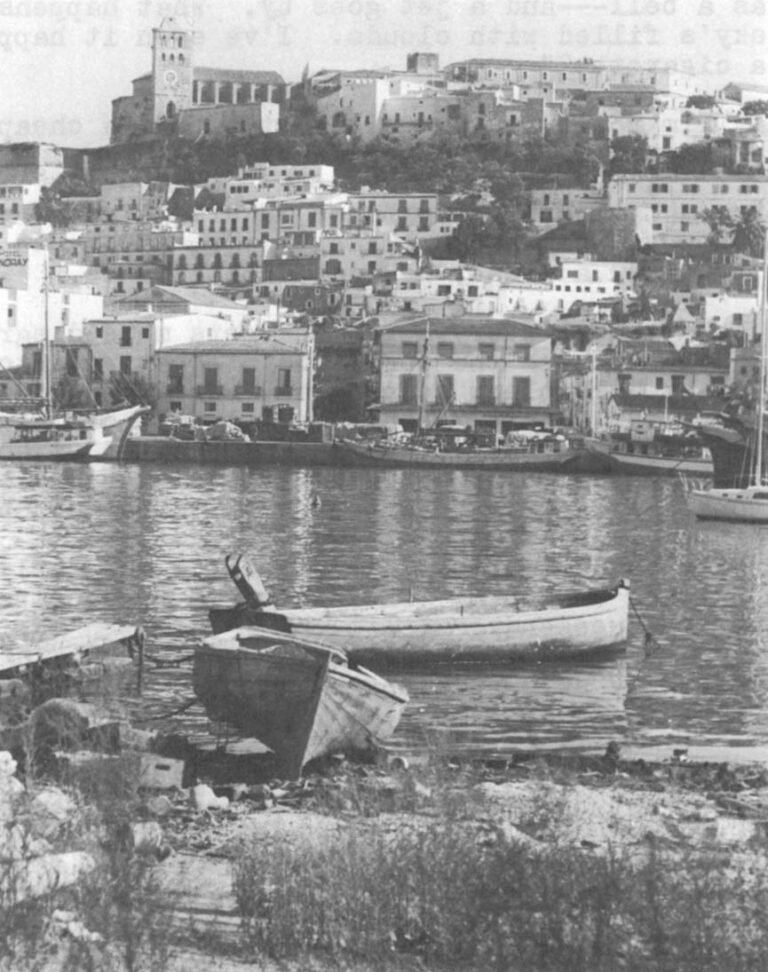
Usually Tim rolls his own cigarettes from a cheap Spanish blend, but company makes that unnecessary.
Lighting a Marlboro, he exhales luxuriously and comments, “I don’t know how you can smoke these things. No taste at all. Bloody awful.” After a pause, he adds, “But thanks.”
Tim’s been almost everywhere, and gets more disgruntled as each day goes by. He sees the world disintegrating into a plastic nightmare ruled by malevolent scientists, corrupt politicians, bomb-throwers, greedy real estate tycoons and (lowest of the low) tourists. His disapproval knows no bounds and is distributed without regard to race, creed, politics or class origins. He’s an angry old man, but never a mean one. In a way, he’s content with being unhappy.
Two pretty young American girls whom he met earlier in the morning have latched onto him. They want Tim to accompany them to Formentera over the weekend.
“Can we really swim nude there? On the beach and everything?” one of the girls asks.
“Mmmn,” Tim says. “Great place, Formentera. Everyone has his own tree. Big shade trees to sleep under. Quite lovely, actually.”
This is surprising news. On his last return from Formentera Tim told everyone the place was “crawling with German tourists.” But the apparent contradiction is actually a part of a larger consistency whereby few grudges are held and utopia, while never here, is seldom far away.
“Wow, it sounds great,” the girl says, hurriedly moving her back-pack from the vicinity of an incontinent dog.
“Won’t be for long,” Tim notes. “Bound to be a Hilton Hotel on it in a few years. The Americans are buying it up.”
According to Tim, the Americans are buying everything up. It’s a view he shares with many Europeans, but he advances it rather more often and vociferously than most. It bothers him because, while he guards his own meager finances with Scrooge-like devotion, he mistrusts wealth more generally. It has, he will confide, ruined the best parts of the world. Besides, he insists, it makes people less self-sufficient: they come to rely on hotels instead of shade trees; on packaged cigarettes instead of the tastier, roll-your-own variety; it lures them into the trap of fashionable clothes and makes them blind to the food that grows for free in the countryside. The only thing American wealth ever made better than anyone else, according to Tim, are repeating rifles and Levi’s.
“You. have. never,” Tim says, pointing indiscriminately at anyone who is listening, “eaten a real tomato, or tasted real milk.” If someone is foolish enough to disagree, Tim merely repeats the formula, adding, “C’mon man! Don’t be ridiculous. They simply aren’t available anymore. It’s all processed now. You’re too young even to remember what they tasted like.”
It’s difficult, and fruitless, to disagree. Tim is an old man who’s been around. And around. Not old, really, but twice as aged as the people whose attitudes and time he shares. If he says you’ve never tasted a real tomato, whatever that is, you probably haven’t.
When someone goes after more beer, he brightens up, chuckles and delivers his ritual benediction: “There ya go, man. There ya go!” Beneath the inevitably combative conversational style is a pacifism that derives as much from passivity as it does from ethics. Tim is too lazy to fight, or too old to think it worthwhile: futility manifests itself as virtue.
When the beer arrives, he takes a sip and says, “This is the only beer in the world that will give you a hang-over when you’ve not had more than a pint. Chemicals,” he explains. “Thanks,” he adds.
It is hard, at first, to understand the profound attraction this cantankerous geezer has for the young. He devalues his own experiences by relegating them to history. Asked about Bali, he’ll say, “Yes, I lived there for quite a while. Beautiful place, and the friendliest people on earth. Incredibly cheap! Lovely palms, deserted beaches…. Of course,” he invariably adds, “all that’s changed now. Real estate people have gobbled it up. Like everywhere else. There’s nowhere to go now.”
So, his experiences are quite useless to anyone else. But despite that, Tim is a magnet to the young people who know him. In his disreputable beard, disintegrating blue-jeans, and battered straw skullcap (formerly a fig container), he draws the young to him and not, as one might expect, as a clown or eccentric would.
His attraction is more complex.
Part of it may lie in the private fantasies of the young, the fantasies which begin, “I’d love to turn-on my old man….” Tim is the same age as most of the fathers of the kids who hang around him, and when the conversation turns to their parents, as it often does, comparisons (to Tim’s pleasure) are made. And Tim comes out on top: he has all the time in the world; he’s never “sold out”; he says what he thinks and when he needs money he just goes out and paints someone’s house. He is, in a sense, the Anti-father, prolonging adolescence into middle-age and encouraging others in the same pursuit.
Another part of his fascination may be that hip young people see themselves in Tim and wonder at it. Because Tim is just an older version of themselves: their opinions are his and so is their life-style. For many youths, Tim provides an answer to the terrible question, “What will happen to me if I never change?” The answer is, “I’ll probably be very much like Tim.”
For some, that prospect is an unhappy one. Even though their wanderings often seem aimless, the young’s travels are seldom so. They may be random, but behind the spontaneity is a quest for absolutes: the perfect woman or the capable man. Others are searching for answers to questions they aren’t even able to pose. Still others look for the perfect place or the key to some hypothesized spiritual identity. Most, however, are just looking for experience and a good time.
In all those quests, Tim will fail them. Ex-soldier and ex-pornographer, he’s discovered neither the perfect place nor the Absolute Woman. His girls are mostly their girls. Whatever “spiritual identity” he may have is well-closeted. His experience is inaccessible and his good-times are predicated on the same stimuli as the young’s: unentangling romances, good beaches, beer, music, conversation, and whatever kif makes it from the Atlas Mountains to Ibiza.
But others who look at Tim and see themselves-in-thirty-years are not dismayed. There are worse fates than having to hustle for a place to crash, some food, and a few beers.
“Tim’s not doing bad,” said one of his friends. “I mean, look at my father: he manages a super-market in Detroit. Always has. And what’s he get out of it? A riding lawn-mower.”
Tim puts it a different way. “I’ve got no complaints. I’ve had a good run. That’s all you can really ask for, isn’t it? A good run?”
Received in New York on October 24, 1972
©1972 Jim Hougan
Jim Hougan is an Alicia Patterson Foundation award winner on leave from The Capital Times (Madison, Wis.). This article may be published with credit to Mr. Hougan, The Capital Times, and the Alicia Patterson Foundation.

